
European Journal of Jewish Studies
Scope & Guideline
Advancing Interdisciplinary Dialogue in Jewish Studies
Introduction
Aims and Scopes
- Jewish History and Cultural Studies:
The journal emphasizes historical research on Jewish communities across Europe, exploring cultural dynamics, traditions, and communal developments from ancient to modern times. - Interdisciplinary Methodologies:
Utilizing a variety of methodologies, including digital humanities, sociological analysis, and literary critique, the journal aims to provide multi-faceted insights into Jewish studies. - Gender and Identity Studies:
A significant focus on gender, identity, and memory allows for a deeper understanding of the Jewish experience, particularly in relation to women and marginalized groups. - Digital Humanities and New Technologies:
The journal encourages the use of digital tools for research, such as distant reading and big data analysis, promoting innovative ways of understanding Jewish texts and history. - Jewish Literature and Arts:
Exploring the contributions of Jewish literature and art, the journal examines the interplay between Jewish identity and creative expression across different historical periods.
Trending and Emerging
- Contemporary Jewish Identity:
Increasing focus on the complexities of Jewish identity in modern contexts, particularly in Central Europe, highlights a shift towards understanding how historical legacies shape current experiences. - Intersectionality in Jewish Studies:
Themes exploring the intersections of gender, ethnicity, and identity are on the rise, reflecting a broader trend in academia towards inclusive and diverse perspectives. - Digital Humanities Applications:
The integration of digital tools and methodologies into Jewish studies is emerging as a significant trend, allowing for innovative analyses of texts and historical data. - Jewish Cultural Production:
There is a growing interest in Jewish literature, art, and cultural expression, with more studies examining the role of Jews in various artistic movements and their contributions to broader cultural dialogues. - Global Jewish Studies:
Research is increasingly considering Jewish experiences in a global context, moving beyond Eurocentric narratives to include diverse Jewish communities worldwide.
Declining or Waning
- Traditional Religious Studies:
There has been a noticeable decline in papers centered on traditional religious practices and theological discussions, suggesting a shift towards more secular and culturally-oriented studies. - Medieval Jewish Mysticism:
Although historically significant, topics centered around medieval Kabbalistic studies and mysticism have decreased, possibly due to a growing interest in contemporary Jewish issues and identities. - Ashkenazi Cultural Focus:
The emphasis on Ashkenazi Jewish culture seems to be waning, with a noticeable increase in studies focusing on Sephardic and Eastern European Jewish experiences, indicating a broadening of the journal's scope. - Holocaust Studies:
Though still important, there appears to be a reduced frequency of Holocaust-related studies as newer themes, such as contemporary Jewish identity and transnationalism, gain traction.
Similar Journals
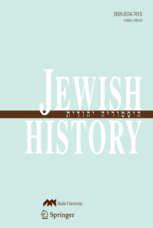
Jewish History
Diving Deep into the Legacy of Jewish LifeJewish History is a significant academic journal published by Springer, focusing on the multifaceted historical narratives of Jewish communities worldwide. With roots tracing back to 1986, this esteemed journal offers an intellectual platform where researchers and scholars can engage critically with the vast and rich tapestry of Jewish heritage, culture, and experiences. Although it operates under a traditional subscription model, the journal has gained a notable standing in recent years, achieving a Q4 ranking in Cultural Studies and a Q3 ranking in History for 2023, reflecting its robust scholarly contributions. The journal is indexed in Scopus, with a rank of #808 in Arts and Humanities History and #754 in Social Sciences Cultural Studies, placing it within the competitive landscape of academic publishing. Its commitment to advancing the field of Jewish studies makes it an essential resource for researchers, professionals, and students alike, who seek to deepen their understanding of Jewish history from historical, cultural, and social perspectives.
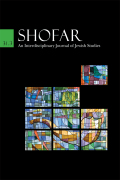
Shofar-An Interdisciplinary Journal of Jewish Studies
Exploring the Depths of Jewish Identity and CultureShofar: An Interdisciplinary Journal of Jewish Studies, published by Purdue University Press, is a prominent peer-reviewed journal that engages with the diverse and rich tapestry of Jewish studies through interdisciplinary approaches. With a focus on cultural studies, history, and religious studies, the journal has established itself within the academic community, achieving significant recognition evidenced by its Q3 ranking in these disciplines as of 2023. Researchers and scholars in the field will find valuable insights and innovative discussions that push the boundaries of traditional scholarship. Though currently not open access, Shofar offers an enriching forum for scholarly discourse that fosters a deeper understanding of Jewish identity, history, and culture, making it an essential resource for professionals and students alike. The journal's ISSN is 0882-8539, while its E-ISSN is 1534-5165. It is operational from 2014 to 2024 and is located in the United States.

Jewish Studies Quarterly
Advancing the Dialogue on Jewish HeritageJewish Studies Quarterly, published by MOHR SIEBECK, is a leading academic journal dedicated to advancing scholarship in the field of Jewish studies. With its ISSN 0944-5706 and E-ISSN 1868-6788, this journal provides a platform for rigorous research that explores various dimensions of Jewish history, culture, religious practices, and contemporary issues. Although it does not currently offer open access options, it remains an essential resource for researchers, professionals, and students seeking insightful analysis and academic discourse. The journal is widely recognized for its commitment to excellence and contribution to understanding Jewish identities within global contexts. Located in Tübingen, Germany, Jewish Studies Quarterly is integral to the dialogue and scholarship surrounding Jewish thought and heritage, making it a vital reference point in the academic community.
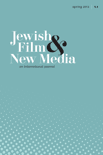
Jewish Film & New Media-An International Journal
Bridging Cultures: A Scholarly Journey Through Jewish CinemaJewish Film & New Media: An International Journal, published by Wayne State University Press, serves as a crucial platform for scholars and practitioners within the realms of Film Studies, Jewish Studies, and Media Studies. Since its inception, the journal has explored the intersection between Jewish culture and cinematic representation while also addressing contemporary media narratives. With an ISSN of 2169-0324 and E-ISSN 2169-0332, it is indexed in major databases, showcasing solid rankings in various disciplines, including a commendable Q2 rank in Visual Arts and Performing Arts. Despite its current Q4 categorizations in Anthropology and Communication, the journal is noted for its engaging contributions that sow rich discussions about Jewish identity, filmic expression, and media representation. Researchers and students alike benefit from the journal’s wealth of interdisciplinary scholarship, which spans converged years from 2013 to 2017 and 2019 to 2022, ensuring a robust timeline of critical inquiry. As an essential resource for understanding the nuances of Jewish film and new media, this journal occupies a unique niche, inviting contributions that push the boundaries of current academic dialogue.
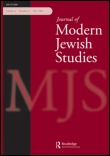
Journal of Modern Jewish Studies
Fostering Insights into Modern Jewish Life and TraditionsThe Journal of Modern Jewish Studies, published by Routledge Journals, Taylor & Francis Ltd, serves as a premier platform for scholarly discourse in the realm of Jewish studies, particularly addressing the contemporary intersections of culture, history, and political science. Established in 2002, this journal has become increasingly vital, as demonstrated by its categorization in the Q3 and Q4 quartiles across various fields, including Cultural Studies and History, showcasing its pivotal role within the academic community. Despite not being an open-access journal, it continues to maintain a robust ranking, being placed in the 74th percentile for History and 62nd percentile for Cultural Studies in the Scopus Ranks. This illustrates the journal's commitment to high-quality research and its significant contribution to understanding the complexities of modern Jewish life and traditions. Based in the United Kingdom, the journal's outreach and content are designed to engage researchers, professionals, and students who are passionate about exploring the diverse facets of Jewish identity and its implications in contemporary society.
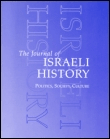
Journal of Israeli History
Unveiling the Complex Narratives of Israel's PastThe Journal of Israeli History, published by Routledge Journals, Taylor & Francis Ltd, is a distinguished platform dedicated to the exploration of the diverse and dynamic history of Israel. With an ISSN of 1353-1042 and an E-ISSN of 1744-0548, this journal has made significant contributions to the field since its inception, bridging cultural studies and political science. Recognized in 2023 with prestigious rankings such as Q1 in History and Q2 in Cultural Studies, the journal offers valuable insights and innovative scholarly work relevant to both historical interpretations and contemporary analyses. Although it does not offer Open Access, the journal is a critical resource for researchers, professionals, and students seeking to deepen their understanding of Israeli history, society, and politics. Situated in the UK at 2-4 Park Square, Milton Park, Abingdon OX14 4RN, Oxon, England, it continues to engage with historical narratives from 1994 through 2024, fostering a rich academic dialogue around the historical complexities of the region.
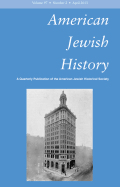
AMERICAN JEWISH HISTORY
Documenting Heritage, Inspiring Future GenerationsAMERICAN JEWISH HISTORY is a premier academic journal published by Johns Hopkins University Press, dedicated to the exploration and analysis of the Jewish experience in the American context. With ISSN 0164-0178 and E-ISSN 1086-3141, this journal serves as a vital resource for scholars and students in the fields of cultural studies, history, and religious studies, as evidenced by its placement in the Q3 quartile across these disciplines in 2023. Reaching a broad audience interested in the historical, social, and cultural dimensions of the American Jewish narrative, the journal has converged in various years, ensuring a robust collection of multidisciplinary research and discussions. Although it operates under a traditional subscription model, the journal remains an essential platform for critical analysis, fostering deeper understanding of Jewish identity and history. With Scopus rankings placing it at the 60th percentile in History and 62nd percentile in Religious Studies, AMERICAN JEWISH HISTORY stands as a respected publication that significantly contributes to the discourse surrounding Jewish history and culture in the United States.

Journal for the Study of Judaism
Unveiling the Depths of Jewish History and LiteratureJournal for the Study of Judaism, published by BRILL, serves as a vital platform for scholarly discourse in the fields of History, Literature and Literary Theory, and Religious Studies. With a commendable impact factor and ranking in the Q2 and Q3 quartiles across its respective categories, this journal facilitates high-quality research that explores the multi-faceted dimensions of Jewish studies from its inception in 1970 to the present day. For those who engage with the journal, the commitment to rigorous peer-review processes ensures publication of significant articles that advance knowledge and foster discussions within the academic community. As an essential resource for researchers, professionals, and students alike, the journal continues to enrich the understanding of Judaism through esteemed contributions of scholarship and critical analysis. The journal’s rich legacy and commitment to excellence make it an indispensable tool for those seeking to deepen their insight into Jewish studies and its broader implications.
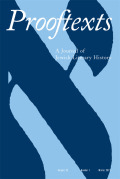
PROOFTEXTS-A JOURNAL OF JEWISH LITERARY HISTORY
Decoding the Rich Tapestry of Jewish Literary TraditionsPROOFTEXTS: A Journal of Jewish Literary History, published by Indiana University Press, is a premier academic journal dedicated to the exploration and critical analysis of Jewish literature and its historical contexts. With an ISSN of 0272-9601 and an E-ISSN of 1086-3311, this journal not only serves as a platform for innovative scholarship but also aims to foster dialogue among scholars in the fields of Cultural Studies, Literature and Literary Theory, and Religious Studies. As evidenced by its 2023 Scopus ranking—place within the third quartile in Cultural Studies and Religious Studies, and second quartile in Literature and Literary Theory—PROOFTEXTS stands out as a significant contributor to academic literature, attracting a diverse readership of researchers, professionals, and students alike. The journal’s commitment to open access is limited, thus ensuring a selective dissemination of high-quality research materials. Researchers are encouraged to contribute their insights and engage with the intricate narratives that shape Jewish literary heritage from 2002 to its convergence during select years, highlighting the ongoing evolution and relevance of this vibrant field. For in-depth understanding of Jewish literary history, PROOFTEXTS remains an indispensable resource.
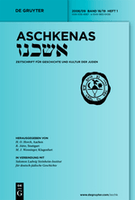
Aschkenas-Zeitschrift fuer Geschichte und Kultur der Juden
Engaging with the Tapestry of Jewish HistoryAschkenas-Zeitschrift fuer Geschichte und Kultur der Juden, published by WALTER DE GRUYTER GMBH, is a distinguished academic journal that delves into the rich history and cultural heritage of Jewish communities. Based in Germany, this journal is indexed under the ISSN 1016-4987 and E-ISSN 1865-9438, making its contributions accessible to an international audience. Although it currently operates without open access options, the journal serves as an important platform for researchers in the fields of Arts and Humanities, History, Literature and Literary Theory, and Religious Studies, as evidenced by its publication history from 1996 to 2023. While ranked in the fourth quartile across various categories on Scopus, the journal provides critical insights and interdisciplinary approaches that enrich the understanding of Jewish cultural narratives. Researchers, professionals, and students alike will find valuable content that not only highlights historical perspectives but also engages with contemporary cultural discussions. This journal remains a vital resource for those seeking to deepen their knowledge and contribute to ongoing dialogues in Jewish studies.